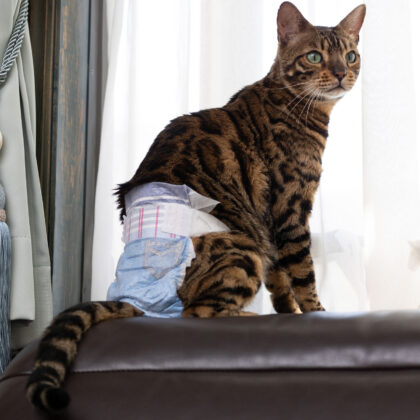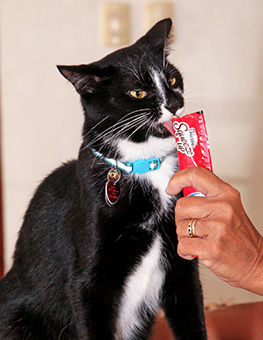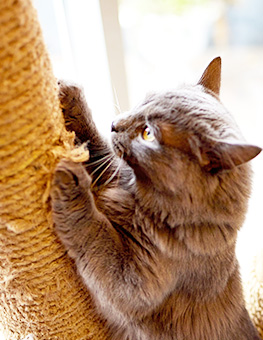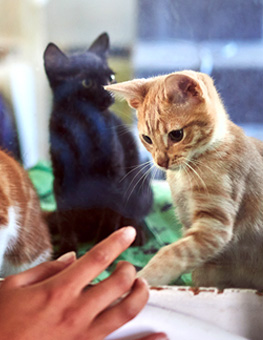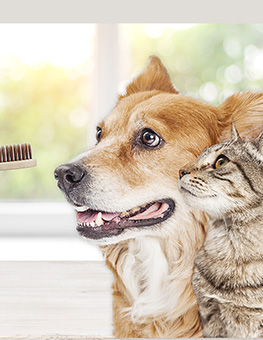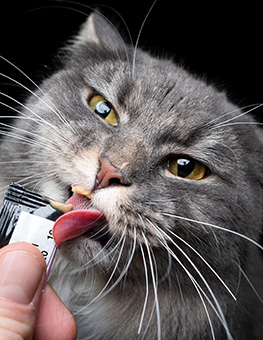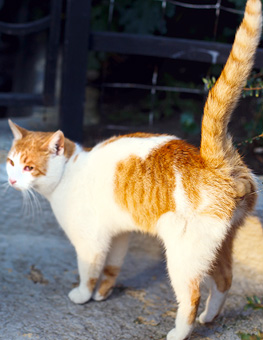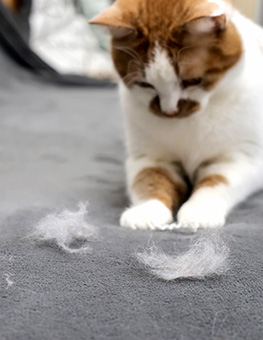Are you playing nice with your kitten?
Kittens use play to learn valuable social skills. As pet owners, our job is to help them set boundaries that encourage healthy behaviors and promote long-term happiness.
Kittens learn a lot from family members during their first 12 weeks of life. Whether they’re roughhousing with siblings or testing boundaries with their mother, a kitten’s education starts early and sets the stage for lifelong habits.
Kittens’ education doesn’t stop when they leave the litter. While lessons learned early on can influence their social behaviors, it’s up to us as pet owners to reinforce this education and help our kittens grow into well-mannered members of the family.
Kittens and Play
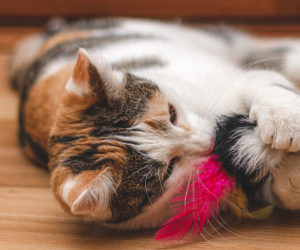
Playtime is an important part of your kitten’s social and motor development.
Playtime is an important part of your kitten’s social and motor development. But it can quickly escalate when your kitten uses its instincts to chase, pounce, bite and scratch in an unhealthy way.
Loaded with energy and equipped with little self-control, kittens often see everything in their environment as a potential plaything, including their owners. So, while preventing bad behaviors in your kitten may not be easy, teaching them the right way to play – and the right things to play with – is key to protecting your fingers, ankles and furniture.
Teaching Kittens How to Play Nice
Kitten bites and scratches might be cute when they’re little, but they can quickly evolve into something painful or even dangerous as they grow into adults. Here are a few rules to follow when playing with your kitten that will set some healthy boundaries:
- Never use your hands, fingers, or toes as part of playtime
- Tell your kitten “no” whenever they misbehave
- Pull hands or feet back if they bite, and redirect them towards one of their toys
- Withdraw your attention by ending play or leaving the room until the kitten is calm
Instead of using your hands or feet to keep your kitten stimulated and to learn acceptable play, offer your kitten a variety of toys that can satisfy their hardwired need to wrestle, hunt and explore.
For Biting & Scratching
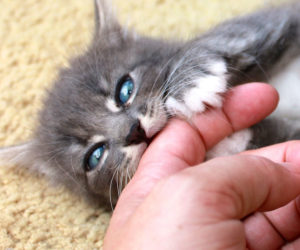
A kitten biting might be cute when they’re little, but it can quickly evolve into something painful as they get older.
Biting and scratching is a big problem when your hands or furniture are involved. While a firm “no” might stop the behavior momentarily, they’ll need toys that can stand up to this kind of play and maintain their interest.
If your kitten likes to bite and scratch, give them a stuffed toy to test their teeth and claws on. What’s more, you might even find your kitten likes to use these toys for comfort instead of “attacking”. Stuffed toys come in all shapes, sizes and materials, and may include catnip to stimulate their interest. This gives your kitten the option to carry these toys around or pounce and attack if they’re feeling frisky.
For Hunting & Chasing
It’s no secret that kittens love to hunt. Ensuring your ankles don’t become a target for this behavior, however, can be tricky.
For kittens with strong hunting instincts, there are a variety of toys available that should satisfy their stalking urges, such as toys that shake, roll, or imitate natural prey. Another great option that will get your kitty’s attention is a fishing pole or wand that has a toy connected, which lets you interact with your kitten, initiate a chase and teach them that toys are meant for playtime.
For Hiding & Exploring
Kittens are intelligent creatures that can get bored quickly if they have few toys or lack stimulation. One of the best ways to keep your little fluff ball from tiring of playtime is to give them a “home” that’s all their own – plus all the bells and whistles that fulfill their playful nature.
Kittens usually require two to three play sessions a day, so use these times to teach them the right way to play. Doing so, you’ll teach them more than good behaviors, you’ll be creating a bond that lasts a lifetime.



